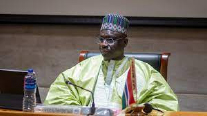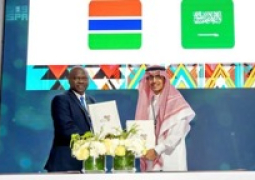
Financial inclusion, he believes, plays a critical role in the efforts to help people prepare to respond and recover from crisis’ such as the COVID-19 pandemic, inflation and climate shocks.
Governor Saidy made these remarks recently while addressing the audience at the official launching of the Nafa Financial Services new mobile app dubbed ‘My Nafa Wallet’.
Financial inclusion is an initiative that seeks to empower the unbanked segment of society, by designing strategies geared towards giving people opportunities to reap the full benefits of the financial system, Mr. Saidy said.
Financial inclusion, according to the CBG governor, has numerous advantages, which include alleviating poverty and enhancing economic development in the country.
‘‘One of the most significant impacts of financial inclusion is potential to alleviate poverty and spur inclusive economic development," he said.
He indicated that poverty remains the biggest moral challenge of the 21st century and policies designed to tackle this menace and uplifting the life of the underprivileged will undoubtedly receive the full support of the Central Bank of The Gambia.
According to him, over one hundred million small- and medium-scale enterprises in emerging markets alone lack access to finance, limiting their ability to grow and thrive.
He added that policymakers and regulators are increasingly working towards promoting regulations that take advantage of new technologies to expand access and usage to underserved segments while ensuring that consumer protection, fair competition, as well as stability and integrity of the financial sector, are critical.
"Evidence shows that the unbanked section of the population is mainly excluded from financial services due to reasons such as low financial literacy, low income, and inadequate information on financial services and products," he mentioned.
According to the 2021 World Bank Global Index, worldwide account ownership has reached 76% of adults and 71% of people in developing countries.
Financial exclusion remains greatest among traditionally underserved groups, including the poor, women, smallholder farmers, and micro, small and medium-sized enterprises.
He said financial policies do not only enhance financial inclusion but also ensure that services are accessible and affordable.
The CBG Governor also said the national financial inclusion strategy aims to increase financial inclusion in The Gambia through the application of innovative financial technologies to improve access, usage quality, and welfare of the citizenry.
He mentioned that affordable access and using quality financial services help families and small business owners generate income, manage irregular cash flow, invest in opportunities, and work their way out of poverty.
Financial inclusion can empower people and communities to meet basic needs, such as nutritious food, clean water, housing, education, and healthcare, the Bank Governor explains.





